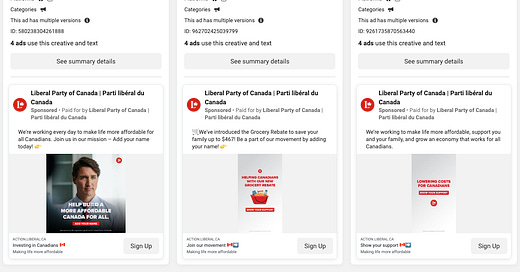Trudeau Likens Bill C-18 Battle To World War Two Fight for Democracy as Government Suspends Meta Advertising (But Not Liberal Party Ads)
Canada now described as being under attack due to Bill C-18 with comparisons to the war in Ukraine or the Second World War.
The government escalated the battle over Bill C-18 yesterday, announcing that it was suspending advertising on Meta’s Facebook and Instagram platforms due the company’s decision to comply with the bill by blocking news sharing and its reluctance to engage in further negotiations on the issue. While the ad ban applies to federal government advertising, Liberal party officials confirmed they plan to continue political advertising on the social networks, suggesting that principled opposition ends when there might be a political cost involved. At issue is roughly $11 million in annual advertising by the federal government, a sum that pales in comparison to the Parliamentary Budget Officer’s estimate of at least $100 million in payments in Canada for news links from Meta alone.
In addition to raising the economic cost to Meta for stopping news sharing, Prime Minister Justin Trudeau increased the rhetoric, describing Canada as having been “attacked” by Meta and likening the government’s fight over the bill to defending democracy in Ukraine or during the Second World War [at 13:30]:
Facebook decided that Canada was a small country, small enough that they could reject our asks. They made the wrong choice by deciding to attack Canada. We want to defend democracy. This is what we’re doing across the world, such as supporting Ukraine. This is what we did during the Second World War. This is what we’re doing every single day in the United Nations.
There are strongly held views on both sides of the Bill C-18 debate, but the suggestion that stopping sharing news links on a social network is in any way comparable to World War 2 is embarrassingly hyperbolic and gives the sense of a government that has lost perspective on the issue. Canadian Heritage Minister Pablo Rodriguez has repeatedly described the manner of compliance with Bill C-18 as a business choice for the Internet companies, yet the Prime Minister now calls that choice an attack on the country.
If it were truly comparable to a world war, then surely the Liberal Party (joined by the NDP) would not continue to advertise on the platform. Yet since the 2021 election call, the party alone has run approximately 11,000 ads on Facebook and Instagram. That is separate from individual MPs, who have also run hundreds of ads. The Meta Ad Library provides ample evidence of how reliant the party has been on social media. For example, since the start of the year, Anna Gainey ran over 500 ads as part of her by-election campaign in Quebec. David Hilderley, who was a candidate in the Oxford by-election, ran approximately 180 ads on Facebook during the same timeframe.
Ultimately, if this is the government’s Plan B to the unfolding mess that is Bill C-18, it is unlikely to make much difference. Government advertising is supposed to be about department communication not subsidy and the suspension may make it harder to reach younger demographics on issues such as summer co-op programs or Canadian Armed Forces recruitment. Regardless, the ad boycott does not alter the foundation of the legislation of mandated payments for links with uncapped liability. Moreover, the costs extend beyond just Canada, as the companies are surely looking to the global market and the potential for billions in liability for linking if others adopt the Bill C-18 approach as their model. Viewed with that prism, a federal government ban that does not even include the governing political party pales in comparison to the risks of the dangerous Bill C-18 precedent.
As I have said for weeks, everyone loses with Bill C-18 and that includes Meta. But it is readily apparent that the Canadian media sector will take the biggest hit with lost links, cancelled deals, and a bill that may not generate any new revenues. The recent experience of the CBC’s Brodie Fenlon provides a vivid illustration of the harm to Canadian media outlets that awaits under Bill C-18. In fact, even if Google finds a compromise position – the government is clearly holding out hope it can strike a deal – the lost revenues from even one platform means this legislation may prove to be a net-negative for the media sector. That suggests that it will soon be time for Plan C, starting with a de-escalation of Prime Minister’s absurd rhetoric of a country under attack.
Post originally appeared at https://www.michaelgeist.ca/2023/07/trudeau-likens-bill-c-18-battle-to-world-war-two-fight-for-democracy-as-government-suspends-meta-advertising-but-not-liberal-party-ads/
Find me on:





I thought old American senators running hearings on tech in Washington was comical/sad but this raises the exponent.